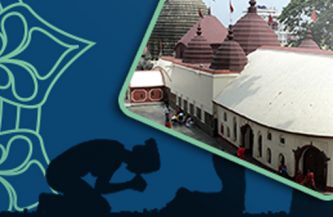The rejuvenation of Indian pride

After 400 years, Kashi Vishwanath Dham has been revived, thanks to Prime Minister Narendra Modi’s resolve, writes Uttar Pradesh chief minister Yogi Adityanath.
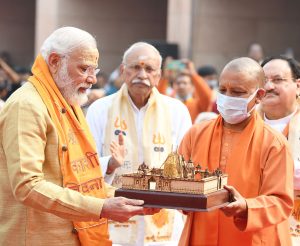
Men who create history are remembered as legendary. Such legendary men are born once in a century. Kashi is witness to such an unprecedented creation of history. Prime Minister (PM) Narendra Modi has achieved what could not be accomplished in a thousand years. He has paved the way for the rejuvenation of Indian pride — after a wait of almost 400 years. Kashi Vishwanath Dham is an example of his determination. The glory of Baba Vishwanath, a victim of the cruelty and destruction by the Mughal rulers, has been revived in the form of Kashi Vishwanath Dham.
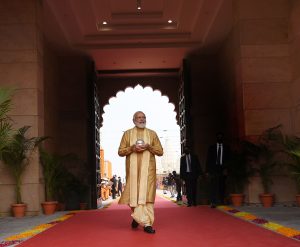
Generations will now bow to this achievement. Manikarnika’s Ganga, entangled in Shiva’s hair, has found the Dham (home) of her adoration. The dream of Queen Ahilyabai Holkar’s eyes has found shelter in the words of a Karmayogi. A golden ark of history has been built in Kashi which will continue to illuminate this Dham of religion and faith with its radiance and energy for millennia.
For a thousand years, the Kashi Vishwanath temple endured the cruelty of foreign invaders. Today, that injustice has been undone. This is the wheel of time. Who would have thought that 400 years after the Kashi Vishwanath temple complex became a victim of Aurangzeb’s cruelty, and 250 years after Maharani Ahilyabai Holkar of Indore laid the foundation to revive the temple, PM Modi would, on the same foundation, erect the golden palace of the faith of tens of millions of Shiva devotees? As some say, greatness is an idea and one thought can create history.
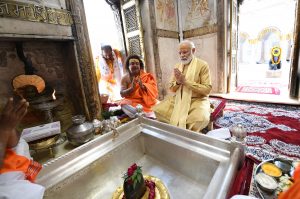
The grand Kashi Vishwanath Dham, which has been recreated today, was one such idea of PM Modi. The ancient splendour of Kashi Vishwanath Temple, one of the 12 Jyotirlingas, has become more luminous and glorious in the light of this modern new construction. On the occasion of 150 years of the birth of Mahatma Gandhi, the PM dreamed of Kashi Vishwanath Dham Yojana to fulfil Gandhiji’s dream. His resolve was to renovate the pagodas and spaces around the temple, connect Baba Vishwanath with the Ganges and restore the Ananda Kanan (literally, forest of bliss) in the world’s oldest living city. This resolution is being fulfilled today in all its divinity and grandeur.

PM Modi is the person who connected this great pilgrimage with its historical, religious, and cultural aura with the Mokshadayini Ganga through the Kashi Vishwanath Dham. It is thanks to this vision that the Kashi Vishwanath Temple, once not even in 5,000 square feet, has grown into a complex of 527,730 square feet under the Kashi Vishwanath Expansion and Beautification Project.
This renovation of Baba Vishwanath’s Dham also includes the illumination of those temples that have emerged from private buildings around the complex that have not only been restored, but whose importance and history have now been captured and will be communicated with the devotees.
We had Herculean challenges in front of us when it came to rejuvenation. Baba’s temple was in a stifling atmosphere. It had to expand. The owners of the buildings and properties around the temple had to be identified and convinced to participate in this Mahayagya. Apart from acquiring the properties, we also had to relocate and rehabilitate shopkeepers, dharamshalas, monasteries and other campuses around the temple. This involved dealing with localised protests, picketing demonstrations, and agitations, and dealing with residents, businesspeople, and unauthorised occupants. The resolution of all this as well as the construction of the Dham in the stipulated time was a big challenge. Only Baba Vishwanath’s blessings could have helped complete this.
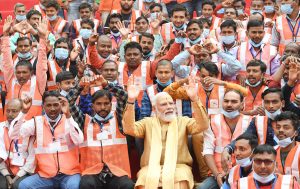
A survey by the architects found that more than 300 properties around the temple had to be removed for the construction of the Dham. We bought 320 houses at a price above the market price. The objective of the Kashi Vishwanath Dham was to give architectural shape by integrating features in the identified area; so, ancient temples were renovated with a focus on mythological, religious, spiritual, cultural and architectural aesthetics. Seven special stones including the red sandstone of Makrana and Chunar have been used in the Dham. The major attractions within this complex include the larger main temple complex, the Bhogshala, the passenger facilitation Centre, spiritual library, Vedic Centre, city museum, and Varanasi gallery.
The reconstruction of this Dham started in March 2018, and today this holy journey has reached its final stage. In its history, the temple alone was renovated many times, but this is the first time the entire Vishwanath Dham has been rebuilt successfully. What PM Modi has done is phenomenal.
The thought process behind this dream project is unprecedented. The devotees coming to witness it will get to know the entire history of Varanasi, the city of Shiva. For this great purpose, a great campaign was run to get the information mentioned in the Upanishads, Vedas and Puranas translated into Hindi and get them printed on the walls of the Dham. Knowing the history of this city which rests on the trident of Shiva is like drinking the nectar of knowledge.

It was in Kashi that Ved Vyas first preached the four Vedas. There are 56 Vinayaks in Kashi. In Kashi, there are seven cities which provide salvation. The 12th Aditya is seated in Kashi. There are five pilgrimages in Kashi. The details of all these will be accessible in the Dham. Apart from this, the establishment of Manikarnika shrine in Kashi, the first Shiva invocation of Dhundhiraj Ganesha, the establishment of Ashta Bhairav, the mission of 64 yoginis of Lord Shankar to Kashi, Kashi, and description of the great poet Kalidas will all be depicted on the plaques of the Dham. The seed of PM Modi’s resolve behind the Kashi Vishwanath Dham has now turned into a tree of faith. And generations of Shiva devotees will continue to prosper under the shade of this banyan tree for centuries to come.
[The Blog was first published in Hindustan Times and is written by Chief Minister of Uttar Pradesh, Shri Yogi Adityanath]




